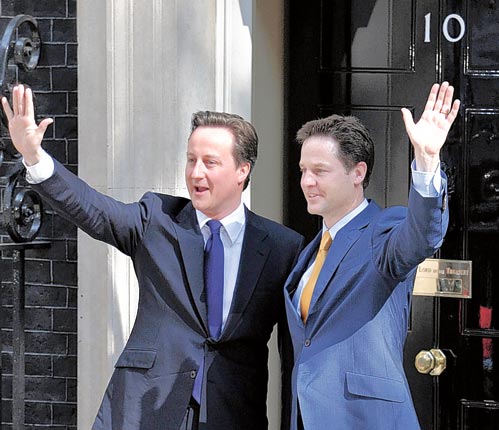Andrew Grice: Labour's nightmare looms: a centre-right alignment
Inside Politics

The new government is bedding down, Conservative and Liberal Democrat ministers work well together and a potentially difficult transition to coalition politics has been remarkably smooth. David Cameron looks the part, as if he has been Prime Minister for years not weeks.
So you might expect Labour to be deep in gloom. You would be wrong. The mood is surprisingly upbeat. Sixty-three of Labour's 258 MPs are new, an unusually large injection of youth, energy and enthusiasm. They have given a tonic (no gin) to a Parliamentary Labour Party that lacked fizz. Older hands are genuinely relieved that Labour did not do even worse in May. Its chances of bouncing back to win next time have been increased by the Liberal Democrats' decision to do a deal with the Conservatives.
The mood at Labour headquarters is bullish. You would not expect people to rush to join a defeated, apparently exhausted party. Yet 21,243 have signed up to Labour since the election. One in three is under 30; 41 per cent are women, broadening the party's base. One in three is a former Liberal Democrat voter, and many feel "let down" or "betrayed" by the decision to form the coalition. Other recruits fear what the Government will do, pointing to the spending cuts and the rise in VAT. Others are Labour supporters who suddenly feel energised enough to become members.
Although many people seem to wish the coalition well and to like the idea of parties co-operating instead of fighting, something else is happening too.
"A political revolt is going on," Harriet Harman, Labour's acting leader, told a Fabian Society dinner this week. When she met 450 recruits to Labour's "Club 2010" in East Ham, she told them: "You are a new political movement."
Ms Harman detects no sign of the mood of resignation when Labour lost elections in the 1980s, when the Tories had a mandate. She argues that the coalition lacked one – not least because the Liberal Democrats opposed at the election the immediate cuts they are now implementing.
Labour is confident that it will do well at the Liberal Democrats' expense at next May's elections to the Scottish Parliament, Welsh Assembly and English local authorities. By then, the cuts will have started to bite. Civil servants describe the planned cuts averaging 25 per cent (outside health and overseas aid) as "horrendous". But for now the numbers mean little to the public.
A revealing foretaste of the anger to come was provided this week by the embarrassing hokey-cokey over cuts to the school-building programme. Michael Gove, the Education Secretary, had the good grace and political nous to say sorry (repeatedly) and take the rap – a reminder, incidentally, that it will not be easy for David Cameron to devolve the pain (while talking about devolving power) to a local level. When things go wrong, the public looks to the Government and there is no escape for the minister.
Mr Gove's handling of the shambles in his department was a welcome break from Labour, which usually tried BSE (blame someone else) and avoided the "S" word. But there will be a lot of angry parents, heads and teachers this weekend, especially those who were told on Monday that their school's project was safe, only to find later that it was not.
You can hardly blame Labour for exploiting the row. Ed Balls, the shadow Education Secretary, has enjoyed a high profile and must have boosted his chances in Labour's leadership race. Yet Labour needs to be careful not to oppose every cut. It doesn't have to fight the next general election now but its leadership candidates are sending a bad signal to the voters by avoiding the cuts issue.
There's another reason why Labour shouldn't get carried away. In the topsy-turvy world created by the coalition, Labour gears up to oppose the change in the voting system which it was the only party to propose at the election. Officially, because the Tories have linked a switch to the Alternative Vote (AV) to a review of parliamentary boundaries which could conveniently compensate Mr Cameron's party for the 20-30 seats they might lose under AV. Unofficially, opposing AV offers Labour a tempting opportunity to take revenge on Nick for cosying up to Dave.
Mr Clegg had to press Mr Cameron to secure an AV referendum as early as next May. But, on reflection, some Cameroons see the referendum as a "win-win" whatever happens. If the public rejects reform, the Prime Minister will have been on the winning side after opposing AV and his party will make a net gain of seats under the boundary changes. If the public votes "Yes", the chances of the coalition lasting until the next election will be greatly enhanced.
And the introduction of AV might have a very different impact to the one Labour envisaged. It hoped the system – in which voters mark candidates in order of preference, with the one coming last eliminated until one secures more than 50 per cent – would encourage Labour and Liberal Democrat supporters to make the other party their second choice to keep the Tories out.
But these Cameroons now dream of a different scenario in which Tory and Liberal Democrat supporters put the other party second. That could hurt Labour. The realignment of politics, long favoured by some Labour and Liberal Democrat figures to marginalise the Tories, might just take place on the centre-right rather than the centre-left and push Labour into the wilderness.

Join our commenting forum
Join thought-provoking conversations, follow other Independent readers and see their replies